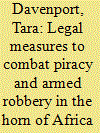| Srl | Item |
| 1 |
ID:
114836


|
|
|
|
|
| Publication |
2012.
|
| Summary/Abstract |
Somalia and Southeast Asia have, at different times, been considered "hotspots" for piracy and armed robbery against ships. Some scholars have argued that comparisons between the two regions are pointless due to the different geopolitical factors that affect the respective regions and vastly different tactics used by Somali pirates and Southeast Asian pirates. Further, the differences in geopolitical considerations and tactics have meant that the legal measures used to respond to attacks in these regions have also greatly differed. The purpose of this article is to critically examine and evaluate the legal measures taken to facilitate the arrest, prosecution and punishment of pirates in Somalia and Southeast Asia. It concludes that while the legal measures employed by the relevant stakeholders differ in each region, valuable lessons can be learned on how States, regional organizations and international organizations can strengthen legal frameworks for the effective arrest and prosecution of perpetrators of piracy and armed robbery.
|
|
|
|
|
|
|
|
|
|
|
|
|
|
|
|
| 2 |
ID:
114641


|
|
|
|
|
| Publication |
2012.
|
| Summary/Abstract |
Submarine communications cables laid on the seabed of the ocean are the foundation of the world's international telecommunications network. International law, in particular, the law of the sea, has recognized the freedom to lay submarine cables and perform associated operations and has placed certain obligations on states related to the protection of submarine cables. This article examines the international law with respect to submarine cables and discusses the various problems with both the law and state practice on submarine cables. It argues that these problems are illustrations of the traditional challenges that face the law of the sea; that is, the balancing and accommodation of competing uses of ocean space. It concludes that an important step toward resolving these problems is enhanced consultation and cooperation between cable companies and governments and that efforts should focus on creating such mechanisms.
|
|
|
|
|
|
|
|
|
|
|
|
|
|
|
|